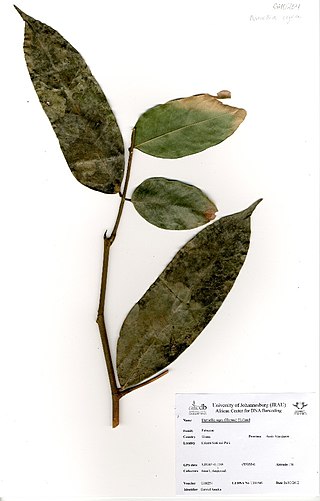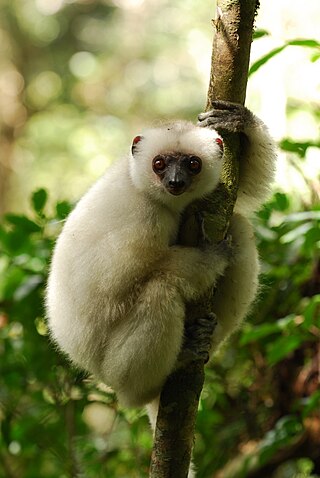
Herring are forage fish, mostly belonging to the family of Clupeidae.
This article is a list of biological species, subspecies, and evolutionary significant units that are known to have become extinct during the Holocene, the current geologic epoch, ordered by their known or approximate date of disappearance from oldest to most recent.

Daniellia is a genus of plants in the family Fabaceae, named after William Freeman Daniell.
Daniellia oblonga is a species of plant in the family Fabaceae. It is found in Benin, Cameroon, Equatorial Guinea, and Nigeria. It is threatened by habitat loss.
Ormocarpum klainei is a species of plant in the family Fabaceae. It is found in Cameroon and Gabon. Its natural habitat is subtropical or tropical dry forests. It is threatened by habitat loss.
Scaphopetalum is a genus previously classified under the plant family Sterculiaceae. Currently, under the APG IV system the genus is placed under the subfamily Byttnerioideae of the family Malvaceae senso lato. The distribution of the genus is restricted to the rain forests of Africa. In total 26 taxa have been described, 21 have been recognized, two invalid and one nomen nudus.

The serows are four species of medium-sized goat-like or antelope-like mammals of the genus Capricornis. All four species of serow were until recently also classified under Naemorhedus, which now only contains the gorals.
Diéfoula Forest is a protected forest in Burkina Faso. It is located in Comoé Province.

The World's 25 Most Endangered Primates is a list of highly endangered primate species selected and published by the International Union for Conservation of Nature (IUCN) Species Survival Commission (SSC) Primate Specialist Group (PSG), the International Primatological Society (IPS), Global Wildlife Conservation (GWC), and Bristol Zoological Society (BZS). The IUCN/SSC PSG worked with Conservation International (CI) to start the list in 2000, but in 2002, during the 19th Congress of the International Primatological Society, primatologists reviewed and debated the list, resulting in the 2002–2004 revision and the endorsement of the IPS. The publication was a joint project between the three conservation organizations until the 2012–2014 list when BZS was added as a publisher. The 2018–2020 list was the first time Conservation International was not among the publishers, replaced instead by GWC. The list has been revised every two years following the biannual Congress of the IPS. Starting with the 2004–2006 report, the title changed to "Primates in Peril: The World's 25 Most Endangered Primates". That same year, the list began to provide information about each species, including their conservation status and the threats they face in the wild. The species text is written in collaboration with experts from the field, with 60 people contributing to the 2006–2008 report and 85 people contributing to the 2008–2010 report. The 2004–2006 and 2006–2008 reports were published in the IUCN/SSC PSG journal Primate Conservation,, since then they have been published as independent publications.
Daniellia oliveri is a species of tree in the family Fabaceae. It is native to tropical West and Central Africa and is commonly known as the African copaiba balsam tree, or the West African copal tree.




